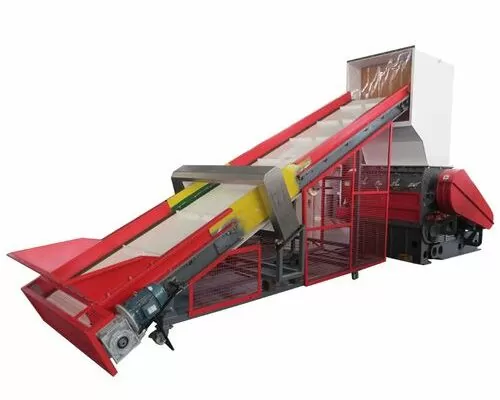Plastic waste is growing faster than any of us can blink. Landfills are bursting, oceans are choking, and energy is being wasted. But for someone like me — running a recycling machinery company — I see opportunity inside every pile of discarded plastic. The big question is: where will the plastic crushing industry go in the next ten years?
Over the next decade, plastic crusher machines will move toward intelligence, automation, energy efficiency, and modular design. Smart factories, AI monitoring, and remote maintenance will become standard, while low-noise and eco-friendly machines will set the new benchmark.
This isn’t science fiction. It’s the natural evolution of our industry. Let’s break down how the plastic crushing world is transforming — and what it means for all of us who build the machines that drive recycling forward.

Why Is the Next Decade So Critical?
In my view, the past decade was about “manufacturing machines.” The next decade is about “reinventing machines.”
According to the Heavy Duty Plastic Crusher For Plastic Bottles, by 2035, the global plastic recycling volume will increase by nearly 60%, and the equipment renewal rate will reach 45%.
That means whoever can make smarter, more efficient, and greener crushers will lead the race. The market doesn’t lack machines — it lacks machines that think.
How Will Smart Crushing Machines Change Production?
Traditional crushers rely heavily on operator experience — adjusting speed, torque, and temperature manually. But people get tired. Machines don’t.
Future crushers will integrate AI self-learning, sensors, and cloud monitoring systems. They’ll automatically identify plastic types, adjust blade speed, and optimize torque. The AI Recycling Tech Report 2024 predicts that smart crushers can increase productivity by 15% and reduce energy use by 12%.
At Amige, we’re already embedding sensor-based intelligence into our twin-shaft shredders. In simple terms, we’re making machines that think before they crush.
Will Energy Efficiency Become the Industry’s Main Theme?
Absolutely. Rising energy costs and carbon emission regulations are forcing manufacturers to think green — not as a slogan, but as a survival strategy.
The next generation of crushers won’t just crush faster; they’ll crush smarter. Expect high-efficiency motors, variable frequency drives, and automatic load balancing systems to become standard features. According to the Plastic drum crusher, such improvements can save up to 20% in energy consumption.
At Amige, we treat energy saving as a business advantage, not a moral duty. In hot, humid markets like Southeast Asia or the Middle East, every kilowatt saved equals higher profits.
Is Modular Design the Future?
Without a doubt. Customers used to face a dilemma — machines were either too small or too big, hard to modify, and expensive to upgrade. The solution is modular design — machines that can be reconfigured like LEGO blocks.
Modular crushers allow fast replacement of rotors, screens, or drive units. You can switch from crushing rigid plastics to film materials in minutes. The Industrial Equipment Modularization Stuey 2024 reports that modular setups cut maintenance time by 40%.
Our Amige Series modular crushers were designed with this in mind — flexible, efficient, and upgrade-friendly. The market is moving away from “one-size-fits-all.” Flexibility is the new efficiency.
How Will the Market Landscape Change?
Competition is shifting fast. The low-price era is ending. The new battlefield is technology, automation, and data integration.
Emerging markets are also rising. Beyond China, Germany, and Italy, we’re seeing rapid demand from India, Vietnam, Saudi Arabia, and Egypt. The Heavy Duty Plastic Crusher For Car Bumper projects a 9.2% CAGR in these regions.
My strategy as CEO of Amige is clear: stay ahead in technology, and expand strategically in new markets. In the next decade, we won’t just sell machines — we’ll deliver complete recycling solutions.
What Role Will Digitalization Play?
Digitalization is no longer optional; it’s essential. Through big data analytics and the Internet of Things (IoT), factories can monitor production, energy use, and machine health in real time.
Digital tools enable remote diagnostics, predictive maintenance, and energy optimization. The Industry 4.0 White Paper 2025 notes that digitalized plants reduce downtime by 25% on average.
In my view, the future of maintenance isn’t repair — it’s prevention. If you can predict a problem before it happens, you’ve already saved money and time.
What Will Customers Care About Most?
The customer mindset is shifting. Ten years ago, they wanted strong machines. Now, they want smart machines.
Future buyers will care less about price and more about efficiency, data integration, and reliability. They’ll expect real-time performance dashboards, cloud access, and automated reporting — especially large recycling plants managing dozens of machines.
That’s why we’re developing Amige Cloud, our remote monitoring platform, so clients can check live data from any device. What customers want most isn’t machinery — it’s peace of mind.
Which Technologies Deserve Investment?
Three areas stand out in my opinion:
- AI-based image recognition for material classification.
- Low-noise blade systems to improve working conditions.
- Energy recovery technology to reuse heat generated during crushing.
The Special plastic pallet crusher identifies AI-assisted crushing as the most promising field in the next five years.
In short, smart, quiet, and green machines will win.
How Will Sustainability and Policy Shape the Industry?
Policy is becoming the invisible hand steering innovation. The EU Circular Economy Act, China’s Carbon Neutrality Goals, and the US Green Recycling Standard are all reshaping how we design and export equipment.
By 2035, 90% of exported recycling machines will need energy-saving certifications and carbon footprint reports.
At Amige, we treat sustainability as a long-term investment, not a marketing term. The future belongs to manufacturers who can meet environmental standards and stay profitable.
Conclusion
The next decade of the plastic crushing industry won’t be defined by steel or horsepower — but by intelligence, efficiency, and sustainability.
At Amige, we’re not just building machines. We’re building the future standards of recycling itself.
